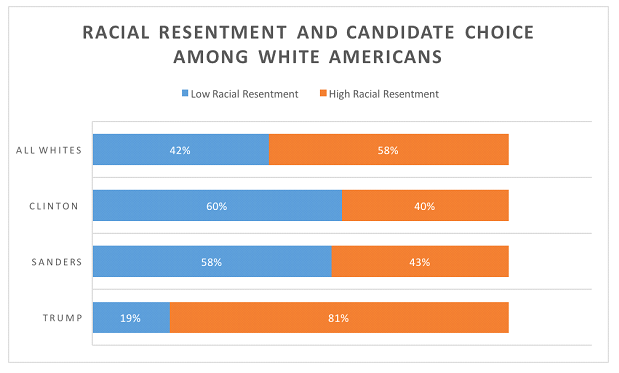Donald Trump's Long History of Racism, From the 1970s to 2016, Explained

It’s been said again and again throughout the 2016 campaign: Donald Trump is a racist.
But it's not just the Trump campaign. Trump has been criticized for being racist for much of his career: The first time Trump appeared in the pages of the New York Times, as my colleague Dara Lind reported, was when the US Department of Justice sued him for racial discrimination. Since then, he has repeatedly appeared in newspaper pages across the world as he inspired more similar controversies.
But when you take all of Trump’s actions and comments, a clear pattern emerges — one that suggests that bigotry is not just campaign opportunism on Trump’s part but a real element of Trump’s personality, character, and career.
Let’s break down Trump’s history of racism, his recent campaign comments, and what exactly they mean.
Trump has a long history of racist controversies
Here’s a breakdown of Trump’s history, taken largely from Lind’s list and a recent op-ed by Nicholas Kristof in the New York Times:
- 1973: The US Department of Justice — under the Nixon administration, out of all administrations — sued the Trump Management Corporation for violating the Fair Housing Act. Federal officials found evidence that Trump had refused to rent to black tenants and lied to black applicants about whether apartments were available, among other accusations. Trump said the federal government was trying to get him to rent to welfare recipients. In the aftermath, he signed an agreement in 1975 agreeing not to discriminate to renters of color without admitting to discriminating before.
- 1988: In a commencement speech at Lehigh University, Trump spent much of his speech accusing countries like Japan of "stripping the United States of economic dignity." This matches much of his current rhetoric on China.
- 1989: In a controversial case that’s been characterized as a modern-day lynching, four black teenagers and one Latino teenager — the "Central Park Five" — were accused of attacking and raping a jogger in New York City. Trump immediately took charge in the case, running an ad in local papers demanding, "BRING BACK THE DEATH PENALTY. BRING BACK OUR POLICE!" The teens’ convictions were later vacated, and the city paid $41 million in a settlement to the teens. But Trump argued that because they were probably, according to him, involved in other criminal activity that night, they were treated too well.
- 1991: A book by John O’Donnell, former president of Trump Plaza Hotel and Casino in Atlantic City, quoted Trump’s criticism of a black accountant: "Black guys counting my money! I hate it. The only kind of people I want counting my money are short guys that wear yarmulkes every day. … I think that the guy is lazy. And it’s probably not his fault, because laziness is a trait in blacks. It really is, I believe that. It’s not anything they can control." Trump at first denied the remarks, but later said in a 1997 Playboy interview that "the stuff O’Donnell wrote about me is probably true."
- 2000: In opposition to a casino proposed by the St. Regis Mohawk tribe, which he saw as a financial threat to his casinos in Atlantic City, Trump secretly ran a series of ads suggesting the tribe had a "record of criminal activity is well documented."
- 2004: In season two of The Apprentice, Trump fired Kevin Allen, a black contestant, for being overeducated. "You're an unbelievably talented guy in terms of education, and you haven’t done anything," Trump said on the show. "At some point you have to say, ‘That’s enough.’"
- 2005: Trump publicly pitched what was essentially The Apprentice: White People vs. Black People. He said he "wasn't particularly happy" with the most recent season of his show, so he was considering "an idea that is fairly controversial — creating a team of successful African Americans versus a team of successful whites. Whether people like that idea or not, it is somewhat reflective of our very vicious world."
- 2010: Just a few years ago, there was a huge national controversy over the "Ground Zero Mosque" — a proposal to build a Muslim community center in Lower Manhattan, near the site of the 9/11 attacks. Trump opposed the project, calling it "insensitive," and offered to buy out one of the investors in the project. On The Late Show With David Letterman, Trump argued, referring to Muslims, "Well, somebody’s blowing us up. Somebody’s blowing up buildings, and somebody’s doing lots of bad stuff."
- 2011: Trump played a big role in pushing false rumors that Obama — the country’s first black president — was not born in the US. He even sent investigators to Hawaii to look into Obama's birth certificate. Obama later released his birth certificate, calling Trump a "carnival barker."
- 2011: While Trump suggested that Obama wasn’t born in the US, he also argued that maybe Obama wasn’t a good enough student to have gotten into Columbia or Harvard Law School, and demanded Obama release his university transcripts. Trump claimed, "I heard he was a terrible student. Terrible. How does a bad student go to Columbia and then to Harvard?"
For many people, none of these incidents, individually, would be totally damning: One of these alone might suggest that Trump is simply a bad speaker and perhaps racially insensitive (not "politically correct," as he would put it), but not overtly racist.
But when you put all these events together, a clear pattern emerges. At the very least, Trump has a history of playing into people’s racism to bolster himself — and that likely says something about him, too.
And of course, there’s his presidential campaign.
On the campaign trail, Trump has made many more racist comments
On top of all that history, Trump has repeatedly made racist — often explicitly so — remarks on the campaign trail. Here’s a running list:
- Trump launched his campaign calling Mexican immigrants "rapists" who are "bringing crime" and "bringing drugs" to the US. His campaign is largely built on building a wall to keep these immigrants out of the US.
- He called for a ban on all Muslims coming into the US. He has since expanded this ban to include anyone from specific countries, including possibly France and Germany.
- When asked at a Republican debate whether all 1.6 billion Muslims hate the US, Trump said, "I mean a lot of them. I mean a lot of them."
- He argued that Judge Gonzalo Curiel — who’s overseeing the Trump University lawsuit — should recuse himself from the case because of his Mexican heritage and membership in a Latino lawyers association. House Speaker Paul Ryan, who’s endorsed Trump, later called such comments "the textbook definition of a racist comment."
- Trump has been repeatedly slow to condemn white supremacists who endorse him, and he regularly retweets messages from white supremacists and neo-Nazis.
- He tweeted and later deleted an image that showed Hillary Clinton in front of a pile of money and by a Jewish Star of David that said, "Most Corrupt Candidate Ever!" The tweet had some very obvious anti-Semitic imagery, but Trump insisted that the star was a sheriff’s badge, and said his campaign shouldn’t have deleted it.
- Trump has repeatedly referred to Sen. Elizabeth Warren, who has said she has Cherokee ancestors, as "Pocahontas."
- At the Republican convention, he officially seized the mantle of the "law and order" candidate — an obvious dog whistle playing to white fears of black crime, even though crime in the US is historically low.
Once again, there’s a pattern of racism and bigotry here that suggests Trump isn’t just misspeaking. It is who he is.
Are Trump’s actions and comments "racist"? Or are they "bigoted"?
One of the common defenses for Trump is that he’s not necessarily racist, because Muslim and Mexican people don’t actually comprise a race. Several pundits have made this argument throughout Trump’s campaign.
Journalist Mark Halperin, for example, said as much when Trump argued Judge Curiel should recuse himself from the Trump University case because of his Mexican heritage, making the astute observation that "Mexico isn’t a race."
Kristof made a similar point in the New York Times: "My view is that ‘racist’ can be a loaded word, a conversation stopper more than a clarifier, and that we should be careful not to use it simply as an epithet. Moreover, Muslims and Latinos can be of any race, so some of those statements technically reflect not so much racism as bigotry. It’s also true that with any single statement, it is possible that Trump misspoke or was misconstrued."
This critique misses the point on two levels.
For one, the argument is tremendously semantic. It’s essentially probing the question: Is Trump racist or is he bigoted? But who cares? Neither is a trait that anyone should want in a presidential candidate — and either label essentially communicates the same criticism.
Another issue is that race is socially malleable. Over the years, Americans considered Germans, Greeks, Irish, Italians, and Spaniards as nonwhite people of different races. That’s changed. Similarly, some Americans today consider Latinos and, to a lesser degree, some people with Muslim and Jewish backgrounds as part of a nonwhite race, too. (As a Latino man, I certainly consider myself to be of a different race, and the treatment I’ve received in the course of my life appears to validate that.) So under current definitions, comments against these groups are, indeed, racist.
This is all possible because, as Jenée Desmond-Harris explained for Vox, race is entirely a social construct with no biological basis. This doesn’t mean race and people’s views of race don’t have real effects on many people — of course they do! — but it means that people’s definitions of race can change over time.
But really, whatever you want to call it, Trump has made racist and bigoted comments in the past. That much should be clear in the long lists above.
Whatever one calls it, Trump’s bigotry is a key part of his campaign
Regardless of how one labels it, Trump’s racism or bigotry is a big part of his campaign — by giving a candidate to the surprisingly many white Americans with huge levels of racial resentment.
One analysis from Daniel Byrd and Loren Collingwood, for instance, found white Trump supporters are much more likely to show high levels of racial resentment than white Americans overall.

Trump has also earned the support of vocal white supremacists and nationalists, including former KKK Grand Wizard David Duke.
Why do so many Ku Klux Klan members support Trump?
"A lot of what he believes, we believe in." https://t.co/AqB3DLKL9f
— Hillary Clinton (@HillaryClinton) August 25, 2016
But Trump’s comments are also hurting him with other voters. Polls have found that support for Trump among black voters, for example, is as low as zero percent in some swing states and 1 percent nationally. In comparison, Mitt Romney got 6 percent of the black vote in 2012 running against the reelection of the nation’s first black president.
This goes against the big goal of the Republicans’ 2013 "autopsy" report, which was supposed to offer a guide after the party’s big loss in 2012. It suggested some of the ways the party could increase support among minority voters — including improved lines of communication. Instead, Republicans got Trump.
This gets to a key point in the 2016 election: Trump can deny his racism or bigotry all he wants. (He has repeatedly told reporters that he’s "the least racist person that you’ve ever encountered.") But at some level, his supporters and opponents get it. As much as his history of racism may show that he’s racist, perhaps who’s supporting or opposing him and why is just as revealing — and it doesn’t paint a favorable picture for Trump.
